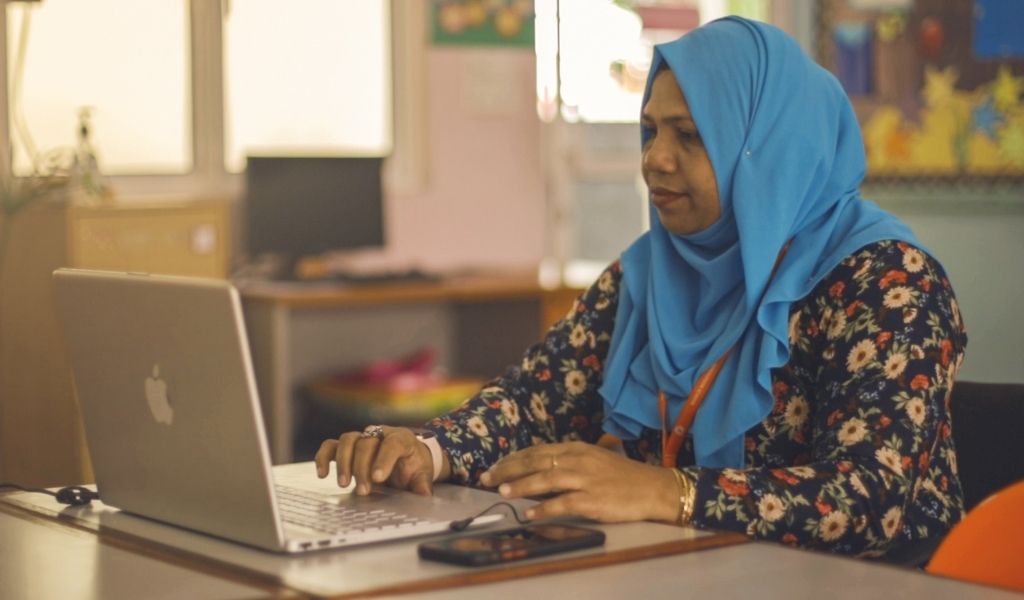
Education & Students With Down Syndrome From The Words Of A Teacher
Becoming a teacher is no doubt one of the most rewarding professions. As a teacher, you get to educate and inspire young minds to hopefully grow up and make a difference in the world. Being a teacher is an important role because you become influential in a child’s life by inspiring, encouraging, and motivating them to reach their full potential – no matter what you teach.
Shafarul Hudha, better known to her students as ‘Sharaf Miss’, began her teaching career as a primary school teacher in her island, about 19 years ago. Due to circumstances, she had to migrate to the capital city, where she decided to seek employment at the same school her children had been enrolled to – as it seemed like the effortless option when it comes to taking her children to school and spending time with them and such. Unbeknownst to her, the school housed children with special education needs thus had Special Education Needs (SEN) classes – something that she was not familiar with at all. However, she came to learn from a friend that teachers for these classes were just as much in demand and that is when Sharaf decided to give it a try.
Prior to commencing teaching, she had the chance to observe SEN classes. At first, she doubted herself. Can she be the kind of teacher that these students need? After a couple of days of working with them, her doubts started to disappear. Sharaf then began motivated to learn more about students with special needs and how she could become of help to them. It has been 12 years since she made that decision and at present, Sharaf is a teacher working at the Jewel Center of Imaadhudheen School who caters to students with a wide range of disabilities with the exception of those that are visually impaired and hearing impaired. In this journey, she has become more confident of her capabilities by educating herself through training and following the lead of experienced teachers in the field.
We discussed with her particularly regarding her experience with students with down syndrome and she was more than happy to enlighten us. At the Jewel Center, students with a wide range of special needs are taught in the same class – however, they are also individually attended to and assigned work based on the level of comprehension and skills in order to really achieve self-development. In this regard, Sharaf notes that students with down syndrome are slow learners – hence needing more time than others to fully understand what is being taught or even to do work that is assigned to them. They are also visual learners who learn by copying other people – and this is often through drama and music. A lot of students with down syndrome, however, do struggle to move around as they tend to have a low muscle tone – so that is something educators must keep in mind especially when it comes to arranging physical activities. A lot of them also have larger tongues which makes it hard for them to pronounce certain words properly or make certain sounds – so you must be a careful listener.
Nevertheless, with the right kind of guidance, students with down syndrome can learn things just as similar to any other person. The key to this is adjusting the teaching technique or approach in a manner that the individual student understands the best. At the Jewel Center, students are taught basic subjects in addition to teaching them basic life skills and sports along with vocational training. One thing which makes teaching students with down syndrome a lot easier is the fact they are really friendly and positive with regard to most things.
Unfortunately, a student can study at the Center until they turn eighteen – following which they graduate. Sharaf highlights this with much sadness as there is almost little to no opportunity for these kids to find employment after graduation. Where there is an opportunity, however, she highlights the difficulties poses in these cases as the employers and fellow colleagues are not as aware as they should be regarding down syndrome – hindering the way for an inclusive work environment.
Whilst one of Sharaf’s biggest dream as a special education teacher is to see her students do great things without being attached the ‘special needs’ label, she also wishes that all parents, teachers and the community can come together to facilitate an inclusive and a safe environment for everyone with special needs. For this to really happen, the society as a whole must be educated. In her capacity as a special education teacher, Sharaf will continue on to make this reality. Will you join her?